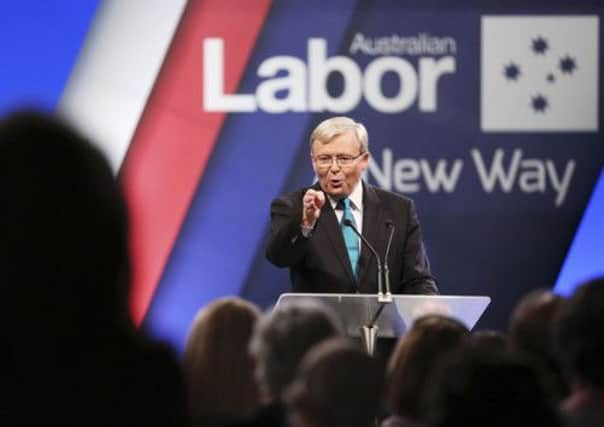Australia, Norway governments braced for defeat


Voters in Australia and Norway are almost certain to boot out their governments within a couple of days of each other, fed up with blunders and scandals, and worried that wealth created by high minerals and oil prices has not been spent wisely.
Opinion polls indicate sound defeats for Australian prime minister Kevin Rudd in parliamentary elections on 7 September and his Norwegian Labour counterpart Jens Stoltenberg on 9 September.
Advertisement
Hide AdAdvertisement
Hide AdIn both countries a weariness with parties that have served relatively long terms is mixed with concern that the economic miracles are fading, leaving the countries badly prepared for life after the resources boom.
This weekend, Oslo lawyer Peter Isaksen gave Mr Stoltenberg no credit for Norway’s good times. “The government doesn’t set the oil price, so that’s not their merit, and we have become dangerously dependent on oil,” said Mr Isaksen, who describes himself as a swing voter.
“It’s a comfortable life now but I’m not so sure about the future,” he added.
Australia’s dusty outback and the freezing seas off Norway are worlds apart, but wealth from there has helped both economies to prosper over the past decade. An unprecedented commodities boom made them among the richest countries in the world, insulated from years of international economic crisis after the 2008 financial crash.
Australia has enjoyed 22 years without a recession, thanks to appetite for its iron ore and coal, while Norway’s per capita GDP hit £64,000 this year on booming oil and gas exports.
While some similarities are striking, so are the differences. Mr Rudd’s Labor party has been beset by a long-running leadership struggle, while the wider election campaign has sunk at times into smear.
By contrast Nordic civility has characterised the Norwegian campaign.
The latest Norwegian opinion poll showed a four-party conservative opposition bloc on course to win 95 seats in parliament, ten more than it needs for a majority. In Australia, polls give the opposition conservatives 53 per cent support to Labor’s 47 per cent, enough to sweep Mr Rudd’s minority government aside.
Advertisement
Hide AdAdvertisement
Hide AdAside from the economy, Mr Rudd’s government has struggled to handle asylum seekers trying to head for the country and to stop human trafficking.
“Voters want governments that do two things: manage the economy and national security. People think they have done neither,” Nick Economou, a political scientist at Monash University in Melbourne said.
Norway has followed an eerily similar path, as record investments in the offshore oil sector pushed wages and the currency sharply higher, leaving traditional industries unable to compete on their already struggling overseas markets.
The Norwegian state is saving oil wealth, amassing £484 billion or £97,000 per man, woman and child. But the opposition accuses the government of wasteful spending, saying it should plough more into infrastructure, health and care of the elderly.
“The state has become a lot bigger but not any better, a lot of people will argue, and there’s a lot of credibility in that argument,” Johannes Bergh, a political analyst at the Institute for Social Research in Oslo said. “People will argue they didn’t do enough to prepare for Norway after the oil.”
More than anything, many Australians and Norwegians just want a change. For Mr Rudd, the biggest problem is voters’ anger about a de-stabilising leadership fight that has lasted for much of Labor’s six years in power. In 2010 Mr Rudd was removed by Julia Gillard, only for Mr Rudd to stage a counter-coup this year after much bitter and very public infighting.
For Mr Stoltenberg, the fight is with history and a dark shadow that has hung over Norway since Breivik attacked the government building and a Labour Party youth camp.
“Talking about the attack is a taboo in the campaign, not least because the attack was on Labour itself,” Terje Knutsen, a political science professor at the University of Bergen said. However, a government commission determined that the Stoltenberg administration, the police and security services had made several blunders and Breivik’s attack may have been preventable. “That report created a strong feeling they are not fit to govern,” Mr Knutsen said.
Advertisement
Hide AdAdvertisement
Hide AdRudd fights for his life as polls and opinion turn against him
Australia’s Prime Minister Kevin Rudd has pledged tax breaks and education programmes to kickstart a faltering economy in a
last-ditch plea to voters.
While polls show Mr Rudd remains a more popular choice of leader than Liberal chief Tony Abbott, Labor’s popularity is lagging behind the opposition coalition before Saturday’s election.
However, voters are also uneasy about promised conservative opposition spending cuts – and Mr Rudd, the leader of Australia’s first minority government in decades, sought to capitalise yesterday in the battleground state of Queensland when he promised a “New Way”.
He warned that cuts would hurt jobs and confidence and told thousands of cheering supporters: “In this election we are now engaged in the fight of our lives.
“Never, ever, ever underestimate my fighting spirit as your prime minister. I have been in tougher spots before and come back from behind.”
However, this weekend newspapers across the country called for a switch in government.
Sydney’s Sun-Herald criticised Mr Rudd’s centre-left Labor as “negative, incoherent, incohesive and, the worst of all, uninspiring”.
Advertisement
Hide AdAdvertisement
Hide AdIn his speech, Mr Rudd appealed to voters with traditional Labor values such as universal healthcare, a pension system holding $1.5 trillion in savings, worker protections and support for a manufacturing sector struggling with a high Australian dollar.
He also warned that conservatives would roll back carbon taxes aimed at protecting the environment and slash an ambitious taxpayer-funded broadband network which is under construction.
Mr Abbott said yesterday that his coalition would detail where savings would be made in the final week of the election campaign.